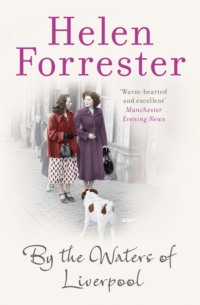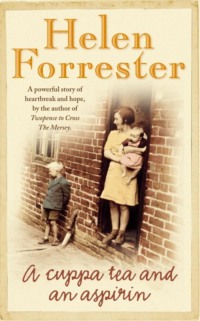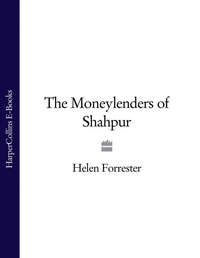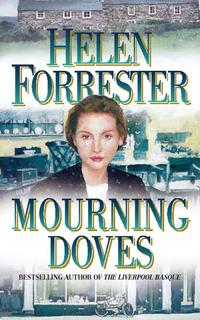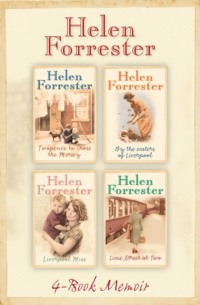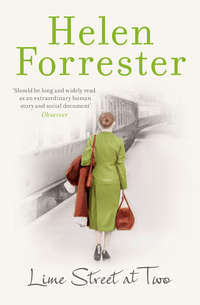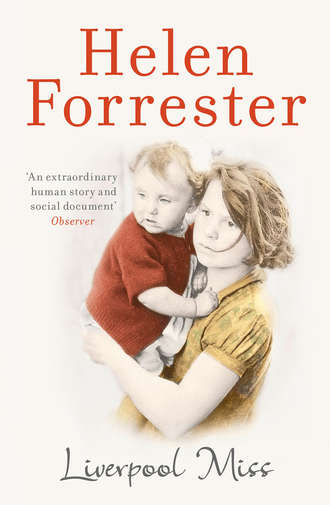
Полная версия
Liverpool Miss
We had two lots of wages coming into the house; yet no housekeeping priorities were ever established. Mother sometimes made long lists of proposed expenditures and debt repayments, but they always ended up being tossed into the fireplace. Creditors who shouted the loudest and threatened most got paid eventually; those that did not received nothing. Cajoling credit out of shopkeepers who respected an Oxford accent was reduced to a fine art by my parents.
I can remember one pay day Mother coming triumphantly home with a box of cream cakes, when we lacked meat, milk, shoes and soap. The children, of course, thought the cakes were wonderful, and I began dimly to understand why our rough, largely Irish, neighbours spent so outrageously on weddings and funerals, cinemas and drink, whenever they got the chance. Life seemed so hopeless that they snatched at any treat, as if they had only the present and there was no future.
There was, however, a number of families nearby with less money than we had, but whose kitchen grate always seemed to have a fire in it, though it might be of slowly collected driftwood rather than of coal. Their children, friends of Fiona, Brian and Tony, were neat and clean; they ate regularly, though I cannot remember a single fat child amongst them. Their mothers obviously mended and washed frequently and could often be seen sweeping the dust out of their front doors, across the pavement and into the gutter. I often heard the sharp snap of rugs being shaken in the back yards, and saw them kneeling on the front pavement as they scrubbed and donkey-stoned their single front step. Some of them even scrubbed the pavement itself as far as the street. The menfolk were usually craftsmen or seamen, skilled with their hands. Some of them, for a couple of shillings, rented a small allotment garden from the City. These gardens were often close to railway embankments or at the edge of the city, and good crops of fruit and vegetables were raised on them during the otherwise empty summer days.
Neither of my parents had been trained to manage money. Grandpa died when Father was six. Father was sent to an excellent public school when he was ten, a school famous for the Shakespearean plays its boys enacted. He acquired a deep understanding of French and English history, and his mathematical abilities were of university level. But nobody taught him how to keep a budget or to manage a family.
Mother was equally ill-prepared for life. She was an orphan, brought up in a convent. She learned how to embroider fine altar cloths and copes; she acquired a smattering of French and other social graces, and a great love of reading. She had a fine singing voice and she learned to sing very well, though not to professional level – that would have been vulgar. The nuns who taught her hammered in the need for virtue in women, but not the basic knowledge which would make a good housewife. Since all their charges were segregated from the opposite sex, except for the skirted priests, the girls appeared to have had a wild curiosity about men and to have forgotten their lessons on virtue. Some of the girls went home to a normal family life during their holidays. But Mother’s guardian was a bachelor, so she stayed at school, to spend summer holidays taking walks with the nuns and other homeless girls, and Christmases and Easters largely in church.
Unlike most of her contemporaries, Mother had had some business experience. Her guardian was the owner of a string of libraries, and when Mother became fifteen he removed her from the convent and taught her his own business. A few years later, he married. Mother was jealous of the new wife and she ran away to North Wales, where she found a post as librarian. There, she met my father during the First World War and married him.
Now we were all suffering dreadfully as a result of their frivolous, irresponsible life after the war. Even hunger, cold, sickness and pain failed to teach them to manage any better.
Poor diet produces rotting teeth, and all of us at times had to endure severe toothache. To alleviate this, we painted the offending tooth with a pennyworth of oil of cloves. Though this did sometimes ease the pain, it did not stop the tooth from deteriorating further. Then abscesses formed. Brian and Avril often sat weeping, while I applied hot poultices to their faces until the abscesses swelled and burst. Father already had false teeth when we arrived in Liverpool. But Mother’s excellent teeth began to loosen from gum disease. When one became too loose, she would wiggle it with her tongue until she could pull it out with her fingers. This must have hurt her and, of course, the gaps in her mouth did not improve her looks, which must have hurt even more. Mouths full of poor teeth were, however, very common in Liverpool, and it was not unusual, particularly in respect of women, to have lost all one’s teeth by the age of twenty-five.
During the second winter of attendance at night school, I found I could not see very well. I had lost some sight and my glasses needed to be replaced. I had also grown, so that the frames were too small for me and my already plain face was made to look even more out of proportion.
A further affliction was an annoying disease called pink eye. At different times all the family caught it. It is an acute inflammation of the eye which causes a heavy discharge, so that the eyes are sealed tight during sleep and in the daytime are flushed a sickly pink. The chemist sold me tiny packets of boracic acid which we made into a solution with hot water, and it helped when we bathed our eyes with it.
But my eyes were always sore, from too much reading through wrong glasses in a bad light. Frequently we lacked pennies to push into the gas meter for the light in the living room, so I read by candlelight or, if we had no candles, I would do my homework leaning against a lamp post, to take advantage of its dim rays. The streets were lit by gas in those days, and the lamplighter would dash on his bicycle from one cast-iron lamp post to the next to pull the chain that lit the lamp. In the early part of the night school term, it was frequently warm enough for me to do my homework in the park, sitting on a bench watching the children, or there was sometimes sufficient daylight to enable me to do it at home. But the deep winter was a time to be dreaded.
I came to my studies hopelessly tired, and always hungry. The quiet order of the school, however, helped my mind to focus; and I made such a violent effort that at the end of the first year I was awarded a very small scholarship to cover the cost of books and fees for the following year. At the end of the second year, if I passed the examinations, I was to move on to a Senior Evening Institute. There the cost of books would be greater; and I had moments of panic while I waited for the results of the examinations, wondering what I would do if I did not win a scholarship this time. And even worse, what would be my fate if I failed the examination itself? My only hope would be gone.
With the exception of Baby Edward, who was still too young, the children had been sent to a local church school as soon as they reached the proper age. They attended with reasonable regularity. If I was ill, Fiona was kept at home to help, but the boys never were. I resented this blatant discrimination. Why, I often argued, was so little attention given to Fiona’s and my future? A lot of anxious talk went on about careers – never jobs – for the boys. Could not girls have careers? My parents thought such remarks were funny, and they laughed. Girls got married, they said.
At night school, the other girls were talking hopefully of getting jobs as shorthand typists or as bookkeepers, and some of them were already at work in shops and offices. They did not seem to be counting on having a husband to keep them, and yet they were all much prettier than me.
I used to watch them as they filed into class, usually dressed in hand-knitted jumpers and dark skirts, rayon stockings and high-heeled court shoes. Their hair was always neatly cut and sometimes Marcel waved. They used powder and lipstick generously and some of them, I noted wistfully, had necklaces, bracelets or rings.
I knew that unless a miracle occurred, I would never manage to look as nice as they did. What chance would I have of employment, even if my parents allowed me to apply for jobs? Just to get rid of the vermin on me would be a heavy task for a Fairy Godmother.
Seven
At best, the years between the ages of fourteen and seventeen are not very balanced ones. Children tend to query and test the prevailing social mores, even when they have been blessed with a stable, comfortable life. Like a window pane through which a stone had been thrown, our family’s life had splintered in every direction, leaving a gaping hole. Almost nothing that I had been taught as a child by Edith or by Grandma seemed to have any relevance in slums where fighting and drunkenness were everyday occurrences, where women stood in dark corners with men, fumbling with each other in a manner I was sure was wrong, though I had no inkling of what they were actually doing; a place where theft was considered smart and children openly showed the goods they had shoplifted; where hunchbacks and cripples of every kind got along as best they could with very little medical care; where language was so full of obscenity that for a long time I did not understand the meaning.
Even in my parents’ light-hearted group, ideas had been discussed, theories of existence expounded, the war knowledgeably refought in the light of history. The availability of music, paintings and fine architecture had been taken for granted. Dress, deportment, manners, education, politics, were all taken seriously.
The comparison was so hopeless that I sometimes laughed. But beneath the laughter, I seethed with suppressed rage and apprehension that even if the rest of the family managed to crawl out of their present sorry state, I would be left behind.
Like water held behind a dam shaken by an earthquake, this anger burst through my natural diffidence, one wet February afternoon, when a plainly dressed lady called at our home. Her hair was hidden by a navy blue coif, such as our Nanny used to wear; and her glasses were perched on a nose reddened by the chilly weather. She wore no makeup, and her navy blue mackintosh reached down to ankles covered in grey woollen stockings. Her black shoes, flat and frumpy, shone despite the rain. I did not recognise my fairy godmother.
When I opened the door a fraction, afraid of yet another creditor, she blinked at me in a friendly way and asked if Mother was at home.
‘No,’ I said cautiously, shifting Edward in my arm so that he could peep round the door, too, without my dropping him.
‘And you are—?’
‘I’m Helen,’ I said. ‘Mother will be at home this evening, if you would like to call again then.’
The wind drove a patter of rain down the street and I heard the click of the front door of the next house as it was opened; the unemployed man next door liked to lean against his own door jamb and listen to my battles with creditors. He would stand and laugh as if he were watching a variety show, and then when it was over, would spit on to our doorstep and go indoors again.
Our visitor’s eyes flickered towards the other door. Then she said, ‘I wonder if I might come in for a moment. I am sure I can explain to you what I have come about.’
Reluctantly, I opened the door wider so that she could step into the muddy hallway. I heard the next door snap shut.
I ushered her into our front room. She paused on the threshold and looked round the room in obvious surprise, as she took off her gloves. The comparison between Edward’s and my threadbare appearance and the pleasantly furnished room must have struck her immediately. The bugs in the walls gave it an unpleasant smell, but in the hope that they had not yet penetrated the pristine easy chairs, I invited her to sit down.
She sat down gingerly on the edge of one of the chairs, while I stood in front of her holding Edward. I did not want to put him down because his feet were bare and very cold.
She said she had come from the church to which the children’s school was attached, and I nodded, though it seemed to me to be remarkable; during the two and a half years that the children had been attending the school no one from the church had called on us, and we, being so shabby, had never attempted to attend it. In fact, I had forgotten that the church existed.
Edward sucked his thumb and laid his head in the curve of my neck, so that throughout the conversation I could hear the placid slush-slush of his little tongue.
The visitor said in a bright, brittle voice that she had heard from Brian’s and Tony’s teachers that their singing voices were good enough for them to sing in the church choir. She had come to inquire if my parents and the boys would be agreeable to this. She knew that Mother worked part-time and she had hoped to catch her at home.
It was never possible for me to forecast what reaction my parents might have to any new situation, so I thanked her cautiously and said that Mother would be home at five o’clock.
She smiled gently up at me, but she did not get up to leave. Instead, she sighed and looked at Edward’s blue bare feet.
There was an uneasy silence, and then she said in a much softer voice, ‘Did you attend our school?’
‘No.’
‘Or the church? Have you been confirmed?’
I cleared my throat nervously and replied again, ‘No.’ Then, since my replies seemed abrupt, I added, ‘I go to night school. I’m in Second Year Commerce.’
‘Where did you go to school?’
Her face was so kind and her interest seemed genuine, so I told her about my four years in a variety of private schools up and down the country, and said rather sadly, ‘I didn’t learn very much. I think, if Grandma had not taught me to read and my aunt to write, I would be illiterate.’
Very slowly, while I rocked a sleepy Edward in my arms, she drew out of me the story of my struggle to go to night school, the fact that I had no clothing to speak of and the other children very little. And with a catch of self-pity in my voice, I finished up, ‘There doesn’t seem to be much hope for anything better for me, unless I can be free to go to work. But there is nobody to look after little Edward, if I do go.’
‘But things seem to be getting better,’ she comforted me. ‘This room is very nicely furnished.’
‘I’d rather Edward had some shoes and socks,’ I retorted suddenly. ‘And you should see the other rooms.’
The dam burst. ‘Come and see,’ I almost ordered her, and strode to the open door. ‘Come and have a look.’
Without a word, her face very serious now, she got up and followed me.
Up the stairs she trudged after me, to the icy, fetid bedrooms, to inspect three iron beds with thin, old-fashioned felt mattresses on them, the urine stains uncovered by any sheet. I had tidied up the bits of blanket and old coats which we used to cover us, and some of the pillows had grubby, white pillow-cases on them.
She looked, aghast, at the door on which I slept. It was balanced on four bricks, one at each corner, and had wads of old newspaper piled on it, instead of a mattress, with a grey piece of sheeting to tuck over them. There was no other furniture, and, of course, there was no bathroom.
In a passion, I swept her downstairs again, to look at the living room, with its bare deal table, assorted straight chairs and upturned paint cans helping out as seats. The only sign of comfort was an old, wooden rocking chair and a very ancient, greasy-looking easy chair, in which was curled a stray cat which Brian had earlier brought in from the rain. On the tiled floor lay a piece of coconut matting, filled with dust. In the old-fashioned iron fireplace I had laid the fire, ready for the children’s return home.
The kitchen looked quite large because there was so little in it. A small table flanked the gas stove, and there was a built-in soapstone sink in one corner. The opposite corner was taken up by a brick copper, with a tiny fireplace under it, for boiling washing. Our single bucket stood under the sink; our only wash basin caught the steady drip from the house’s cold water tap.
Long lines of shelves ran down one side of the kitchen. They held a motley assortment of rough, white dishes and cups, two saucepans and a dripping tin. A kettle sat on the gas stove beside a tin teapot. A small wooden table held our bits of food, a packet of tea and a blue-bagged pound of sugar, some margarine in a saucer and a new loaf.
I was shivering with cold and with emotion, and my visitor turned pitying, gentle eyes upon me. ‘Don’t you have a fire?’ she asked. They were the first words she had spoken during our lightning tour.
‘Edward and I manage during the day. I light the fire for the children coming home at lunch time, and then I re-light it for tea time.’
I realised, as I said this, that Edward and I were just as vulnerable to cold as the others were, but we remained in the frigid house while everyone else spent the day in warm buildings. No wonder my joints hurt when I moved. No wonder Edward sometimes cried because of the cold.
‘Where do you keep your food?’ she asked.
‘On the table here,’ I said. ‘I buy it every day.’
She bit her lips, as she pondered over the bread and margarine, and I said a little defensively, ‘Avril or Tony will fetch a pint of milk from the dairy when they come in.’
Edward had gone to sleep, so I led the way back into the living room and laid him down in the easy chair, after pushing off the cat. He stirred, but slept on, his tiny legs spread-eagled. ‘I’ll get something to cover him,’ I told the lady, and flashed up the stairs to get a coat.
When I came back she was still standing where I had left her, and I hastily tucked Edward up before I turned again to face her. My hysterical outburst had spent itself and I felt exhausted and ashamed.
‘I’m sorry,’ I said, ‘I should not have bothered you with all this. And I’m sorry it is not very clean – but I have nothing but a broom and cold water with which to clean – it’s just impossible.’
She seemed wrapped in thought, almost as if she had not heard me. Then she smiled at me very sweetly. ‘I’m glad you did show me,’ she said reassuringly. ‘I can understand better the struggle you are having. Don’t be discouraged – things have a way of getting better.’
I tried to smile back. I did not believe her.
‘I’ll come again this evening to see your mother,’ she continued, a briskness in her voice.
As I let her out of the house, she turned again to me. ‘Now remember. No getting discouraged.’
I nodded, then she smiled and went out into the rain; her coif was wet before I had closed the door.
She came, as promised, and then again and again. She was a deaconess, and mother seemed to like her because she was a gentle, cultivated woman. First Brian and, later, Tony joined the choir, their white surplices saving them from the embarrassment of their shabby clothes. Later on, Tony became an altar boy, and the faith he acquired whilst kneeling in the richly decorated sanctuary never left him. He has always been an active member of the Church of England. The experience must also have helped mischievous, highly-strung Brian because, if nothing else, he learned music by many of the great composers in a bright and beautiful church. Both boys were allowed to retain the one shilling and eightpence per month paid to them for their services.
Apparently, the deaconess did not tell Mother of her tour of our house. She did, however, become an earnest advocate on my behalf. Not all fairy godmothers carry wands.
Eight
Father sometimes bought a Liverpool Echo to read on the tram while coming home from work. A day or two later, before using the newspaper to start the fire, I would read it, as I knelt on the coconut matting in front of the big, black, living-room fireplace.
I loved news of Royalty. Love of the royal family is still quite strong, but in those days, particularly amongst women, it was close to a passion. All our princes were officially handsome, and the courtship of Princess Marina of Greece by Prince George, Duke of Kent, was a romance about which many a girl like myself dreamed wistfully. I followed developments from day to day with eager anticipation.
I also began to read the advertisements, including the ones offering jobs. Once or twice I stole a piece of Mother’s notepaper and wrote replies. I was not a very good writer but I had been taught in night school how to formulate a letter of application, which was a help. I said I had been privately educated. This was true and absolved me from having to say how few years I had been in school. It also accounted for my not having matriculated, because some girls in private schools did not attempt matriculation; they went on to finishing schools in France or Switzerland. I imagined my childhood friend, Joan, was currently attending such a school.
I told the advertisers that my appearance was neat, which was far from true, and that I was honest and hardworking and was attending evening school. With the letters wrapped in a piece of newspaper to keep them clean, I then wheeled Edward down the long hill to Victoria Street in the centre of the town and hopefully slipped the letters in the box provided by the Liverpool Echo for replies.
Nothing happened.
Then one day I received a reply, in handwriting far worse than my own, from a sweet shop near St Luke’s Church. They wanted an assistant and asked me to come to see them the following day, a Saturday. I was dazzled at the prospect.
I hummed all day, as I waited for the evening and the return of my parents. The children found me unusually cheerful at midday, as I gave them their main meal, a half-pound of stewed, minced beef between the six of them, and mashed, boiled potatoes. They had tea to drink. Because they had a little meat, the food was an improvement over their fare during the first two years of our sojourn in Liverpool. It was also easier for me to cook it. An old gas stove was already in the house when we rented it and it worked, as long as I had the necessary penny to put in the meter. In the apartment we had first rented, I had had to cook on a bedroom fireplace, on a fire frequently kept going with scraps of rubbish culled from the streets.
Mother and Father ate their lunches in cafes or took a sandwich with them. My lunch was boiled potato. This, with the occasional addition of carrots, onions or cabbage, was my staple meal for a number of years, and it is doubtful if my parents fared much better.
Lack of nourishing food added to my parents’ irritation. Mother had always had an uncontrollable temper, terrifying to maids, children and shell-shocked husband alike, and these towering tantrums reached almost insane levels during the years in which we suffered so much poverty. So I approached my parents on the subject of the letter with the care of a cat stalking a mouse.
To no purpose.
Father, at times, seemed to live in a never-never land of illusion. He looked at me over his gold-rimmed spectacles, while he sipped a last cup of tea, and said firmly that I could not be spared to go to work at present. Who would look after Edward and the children’s dinner if I were absent? Perhaps, later on, he added cheerfully, I could be sent to a teachers’ training college and become a school mistress. But a shop assistant? Never! That would be absurd.
I almost laughed at him. ‘Which training college would consider a girl with only four years of schooling?’
His reply was drowned out by Mother’s musical contralto saying firmly, ‘Your place is at home, Helen. It’s the most sensible arrangement. In a few years you will marry and by then Edward will be old enough to look after himself.’
I was aghast. ‘But you’ve always said – everybody’s always said – that I am so plain. How can I get married if I’m so ugly? I’ll be stuck here for ever.’ I began to cry, with hot, angry sobs.


